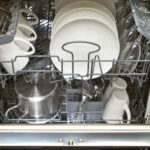October 12, 2010 | Laundry Appliance Repair, Help & Advice |
There are a lot of different laundry detergents out there – but which is the right one for your clothes? You walk down the aisle in the supermarket and you’ve got Ariel here, Persil there, non-biological coming at you, tabs, powder, you name it. While many might use a ‘spray and pray’ technique when choosing detergent, it is possible to make a more informed choice. And that’s where I come in.
Biological. Non-biological. What’s the difference?
Biological detergents, the more ‘heavy duty’ of the two, contain enzymes which break down dirt and stains in a manner similar to the enzymes in our own bodies that digest food. It means clothes will get clean even at low temperatures – which is environmentally friendly. The flipside to this though is that the enzymes take a long time to degrade. Additionally, it’s also possible to suffer allergic reactions to these enzymes.
The gentler option is a non-biological detergent. These don’t use enzymes – they are more akin to soap. As such, they are kinder on the skin, and you are very unlikely to suffer reactions. They’re also kinder to fabrics, as the enzymes in biological detergents can cause damage over a prolonged period of time. The downside is that because the detergent has to work harder to remove stains, you’ll need to use a higher temperature to make sure your clothes are cleaned properly – this has an environmental impact.
Liquid, Tabs or Powder?
All three forms of detergent have their pros and cons. Powder was the only detergent form for many years, and historically has proved itself. There’re bleaching agents in powder which makes it suited to whites, but should be used with more caution with coloured laundry. Another potential pitfall of powder is that over time it can clog the washing machine dispenser drawer and pipes.
Liquid and tabs can be put straight in to the drum, so you’re not running the risk of a clogged dispenser, and it’s an added convenience too. These forms of detergents don’t contain bleaching agents, so are opposite to powder – a lot better suited to coloured laundry, and potentially not strong enough for whites, which may leave stains even after the wash has finished.
As for which brand you use, that’s more a matter of personal preference – which you think has the most pleasant smell, which is suited best to hard or soft water, which is the best value and so on.
Remember, no matter what detergent you use, we’ve got thousands of washing machine spares for over a hundred different brands.








